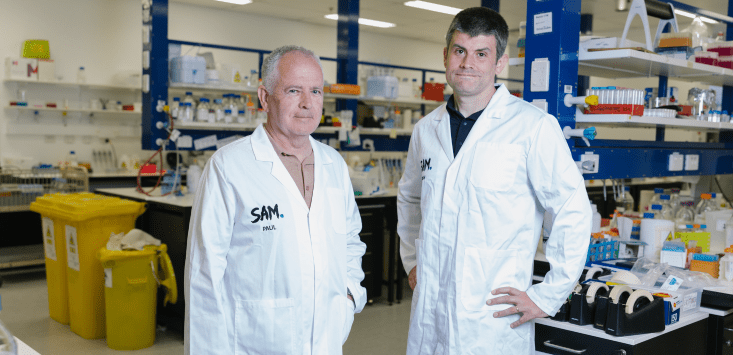
Source: Supplied
Aussie enviro-tech startup Samsara Eco will partner with activewear giant Lululemon to create what the company says will be the world’s first infinitely recycled textiles, greatly accelerating its commercialisation plans just seven months after it raised $56 million in funding.
Lululemon, the global apparel company founded in 1998 in Canada, will take a minority stake in Samsara Eco as part of the multi-year deal, which will see the companies work together to produce infinitely recycled nylon 6,6 and polyester. The size of the stake is not being disclosed.
Speaking to SmartCompany, Samsara Eco co-founder Paul Riley described the partnership as “incredibly important” for his company as it provides “commercial confirmation” of its breakthrough technology.
“To be able to access the resources, skills and supply chain of Lululemon is going to mean that we can drive towards having a product in market a lot sooner,” he says.
Work has been underway over the past 12 months on the partnership, which will see the two companies use apparel waste to create new recycled nylon and polyester. Samsara Eco’s technology uses enzymes to break plastic down to its core monomers, or ‘building blocks’, which can then be used to recreate new plastic in the future.
It means the startup will be able to start tackling the tonnes of discarded textiles that end up in landfill each year. Approximately 60% of clothing produced today is made from nylon and polyester, which are both types of plastic that are derived from fossil fuels.
This is the first time Lululemon has made a minority investment in a recycling company and it’s Samsara Eco’s first partnership in the apparel sector. It forms part of Samsara Eco’s broader goal of recycling 1.5 million tonnes of plastic annually by 2030.
“There’s no option for a lot of the apparel industry in terms of recycling,” says Riley when discussing the significance of this partnership in terms of market potential.
As well as the enzymes to break down polyester and nylon, Riley reveals Samsara Eco also has other enzymes “very close” that will work on the remaining synthetic fibres used by the apparel industry.

Source: Supplied
“That allows us to do mixed-colour textiles and depolarise them,” he explains. “That’s unheard of”.
“It means there is a real opportunity to fibre-to-fibre recycling. At the moment, it is less than one percent that is fibre-to-fibre. So our ability to do multi-textile, mixed-colour fabric and take it back to its original monomers is quite revolutionary for the fashion industry”.
From fashion to packaging, and even cars
Riley co-founded Samsara Eco in 2018, through a partnership with VC firm Main Sequence, Woolworths and the Australian National University, and the startup has grown substantially in the five years since.
It partnered with the Australian Open in January 2022 to recycle thousands of plastic bottles discarded by players, in March 2022, it secured $6 million in capital to begin construction on a local recycling plant.
By November 2022, Samsara Eco had secured $56 million in funding, with new investments from the likes of Breakthrough Victoria, Tamasek, Assembly Climate Capital, DCVC and INP Capital.
These backers joined existing investors Main Sequence, Woolworths Group’s W23 and the Clean Energy Finance Corporation Innovation Fund, which is managed by Virescent Ventures.
The Samsara Eco team has grown too; when the startup raised capital in November 2022, it had a team of 25. Now, Riley says, there’s 51 members on the team.
Discussions with other companies in the apparel industry are underway, he confirms, and Samsara Eco expects to have further partnerships to announce “in the near future”.
At the same time, other industries that use large amounts of plastic are also eager to learn more about Samsara Eco’s technology.
“Across packaging we are certainly having some conversations. The polyester is equally applicable to packaging as it is to fashion. And we’re having some preliminary discussions in the automotive space as well. A lot of plastics, polyurethanes go into cars. So we’re having some good discussions in that space.”
Handpicked for you

‘Infinite recycling’ startup partners with Australian Open to tackle water bottle waste



COMMENTS
SmartCompany is committed to hosting lively discussions. Help us keep the conversation useful, interesting and welcoming. We aim to publish comments quickly in the interest of promoting robust conversation, but we’re a small team and we deploy filters to protect against legal risk. Occasionally your comment may be held up while it is being reviewed, but we’re working as fast as we can to keep the conversation rolling.
The SmartCompany comment section is members-only content. Please subscribe to leave a comment.
The SmartCompany comment section is members-only content. Please login to leave a comment.